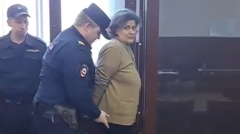As Ukraine faces wartime challenges, lawmakers explore the possibility of legalizing pornography, addressing taxation inconsistencies, and potentially enhancing the economy.
**Ukraine's Ongoing Legal Dilemma: The Paradox of Pornography Production Amid War**

**Ukraine's Ongoing Legal Dilemma: The Paradox of Pornography Production Amid War**
Amidst challenges posed by the ongoing conflict, Ukraine debates the legalization of pornography to rectify a legal paradox while increasing tax revenues.
In the backdrop of the ongoing conflict with Russia, Ukraine finds itself grappling with a peculiar legal contradiction involving pornography. As the war continues to affect various sectors, some lawmakers argue that the nation should reconsider its stance on adult content. Deputy chairman of Ukraine’s Parliament’s finance committee, Yaroslav Zhelezniak, has initiated discussions aimed at decriminalizing the production and distribution of pornography.
Zhelezniak’s proposal aims to eliminate outdated Soviet-era laws that not only ban pornographic content but also impose punishments ranging from three to five years in prison for violations. The irony of the current situation is striking: while creators of adult content are subject to these legal restrictions, they are also taxed on their revenue by Ukrainian financial authorities. Popular platforms such as OnlyFans contribute to this contradiction, as individuals pay taxes on earnings derived from work that the state simultaneously criminalizes.
“It’s absurd,” Zhelezniak stated, particularly highlighting the strangeness of enforcing such laws during an intense wartime period. He further posits that changing the legislation could offer an economic boost by increasing tax revenues, as more creators may feel encouraged to declare their earnings if the work they do were legal.
The push for reform reflects a broader conversation in Ukraine about balancing legal frameworks with contemporary realities, especially in light of a struggling economy under the strain of prolonged conflict. The government’s potential shift in policy regarding adult content could serve not just to rectify legal inconsistencies but also as a tool for economic recovery.
Zhelezniak’s proposal aims to eliminate outdated Soviet-era laws that not only ban pornographic content but also impose punishments ranging from three to five years in prison for violations. The irony of the current situation is striking: while creators of adult content are subject to these legal restrictions, they are also taxed on their revenue by Ukrainian financial authorities. Popular platforms such as OnlyFans contribute to this contradiction, as individuals pay taxes on earnings derived from work that the state simultaneously criminalizes.
“It’s absurd,” Zhelezniak stated, particularly highlighting the strangeness of enforcing such laws during an intense wartime period. He further posits that changing the legislation could offer an economic boost by increasing tax revenues, as more creators may feel encouraged to declare their earnings if the work they do were legal.
The push for reform reflects a broader conversation in Ukraine about balancing legal frameworks with contemporary realities, especially in light of a struggling economy under the strain of prolonged conflict. The government’s potential shift in policy regarding adult content could serve not just to rectify legal inconsistencies but also as a tool for economic recovery.























